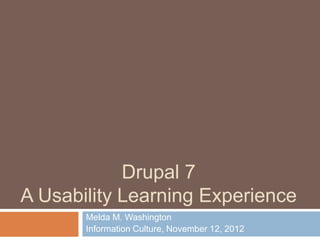
IDIA 620: Information Culture - Usability
- 1. Drupal 7 A Usability Learning Experience Melda M. Washington Information Culture, November 12, 2012
- 2. Overview Introduction Google’s Drupal Study My Drupal Conclusion
- 3. Introduction Redesign and CMS implementation of its existing collections online search. The redesigned collections online infrastructure should improve the search site’s ease of use, provide, and allow users access to the most up-to-date content. Freer|Sackler migration from Classic ASP/Coldfusion to Drupal Integrate DAMS and IDS
- 4. Introduction
- 5. Introduction
- 6. Google’s Drupal Study Drupal 7 Usability Study at Google Eight tech-savvy Google employees for one hour usability sessions. Created four layers that encompass the issues study participants faced: 1. Conceptual 2. Flow 3. Terminology 4. Interface
- 7. Google’s Drupal Study What does it feel like to be a new Drupal user? A new user feels... confused and overwhelmed by Drupal’s presentation of features/options. alienated by unexplained terminology throughout Drupal. helpless because of a perceived lack of support. (Omega Theme) in the dark about the extent of Drupal’s capabilities. uncertain about his/her progress while performing tasks. stupid because they assume they are using Drupal “incorrectly.”
- 8. Google’s Drupal Study – Conceptual Layer We think that if users are given a basic primer that teaches them how Drupal thinks, it would prevent much of the frustration that our participants experienced. Most problems that new users encounter boil down to a missing understanding of how Drupal works. Users conceptually understand blogs; they feel comfortable when Drupal acts like a blog. Drupal is more than just a blog, but it never explains the way it works.
- 9. Google’s Drupal Study – Conceptual Layer
- 10. Google’s Drupal Study – Flow Layer Needs to be a more conscious effort of how and when information and options are exposed to users. Users need to be given more feedback and guidance as they move through Drupal interfaces. New users need more handholding to become proficient faster. New users feel lost inside Drupal because they can’t tell what they are looking at, how they got there, or where they are supposed to go next to complete tasks. Their mental models often conflict with how Drupal is actually implemented.
- 11. Google’s Drupal Study – Flow Layer
- 12. Google’s Drupal Study – Terminology Layer The best way to confuse users is to use words they don’t understand and never explain them. The Drupal community should strive to use logical names. When that isn’t possible, help users start speaking Drupalese. New users need more handholding to become proficient faster. New users feel lost inside Drupal because they can’t tell what they are looking at, how they got there, or where they are supposed to go next to complete tasks. Their mental models often conflict with how Drupal is actually implemented.
- 13. Google’s Drupal Study – Terminology Layer
- 14. Google’s Drupal Study – Interface Layer It should be a top priority to fix obvious interface fails (detailed in the drupal.org handbook page). Interface elements that are not broken yet consistently confuse users should be examined and improved. New users don’t trust Drupal. Bad experiences with interfaces leave users uncertain about what will result from their actions.
- 15. Google’s Drupal Study – Interface Layer
- 16. My Drupal
- 17. My Drupal
- 18. Questions?
